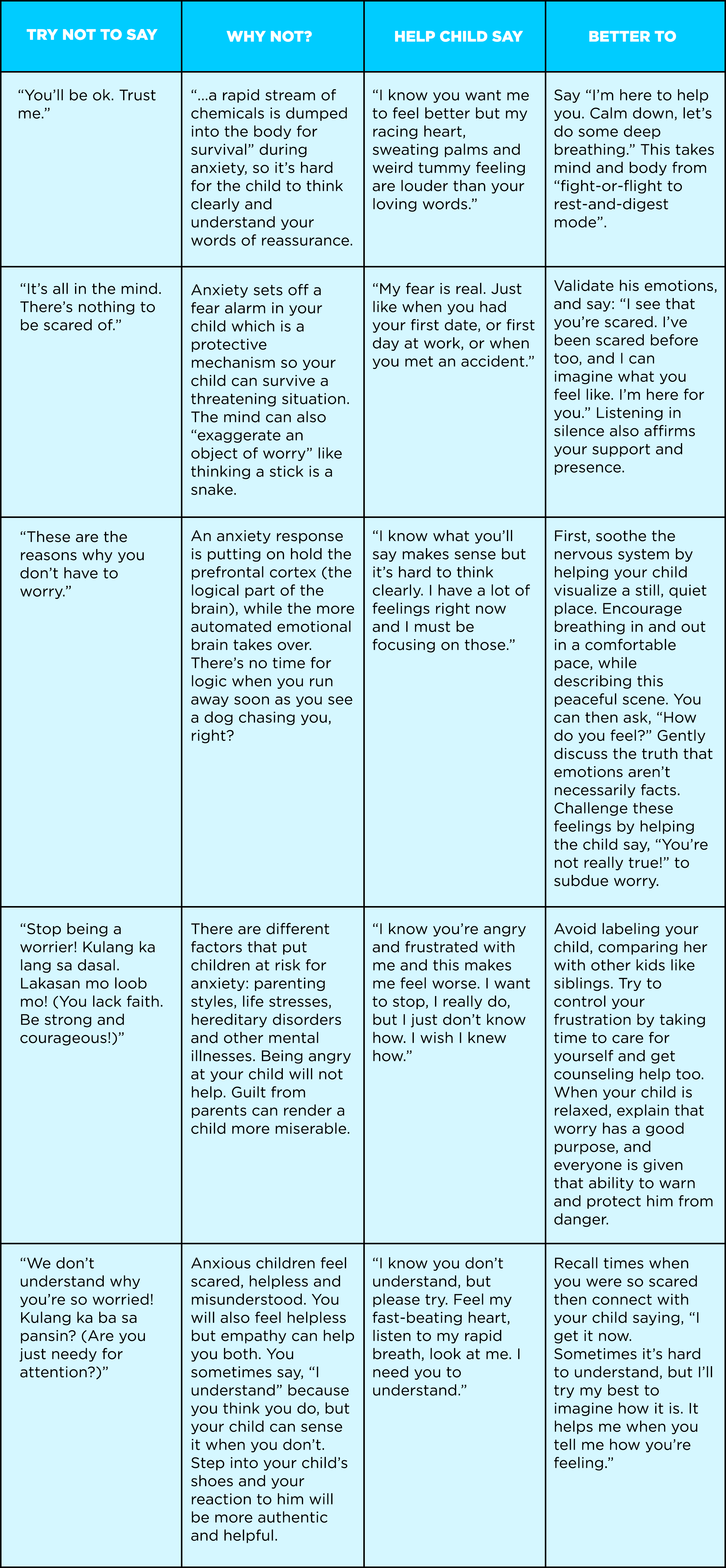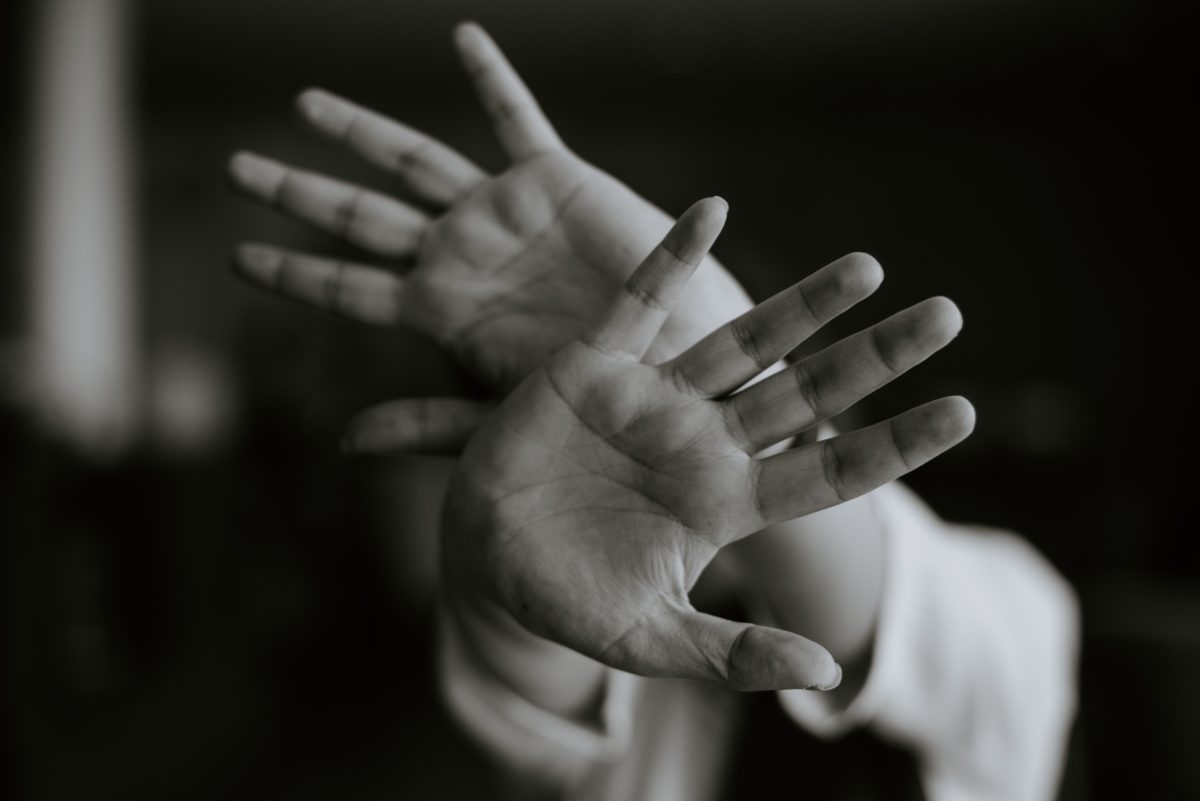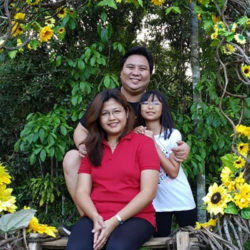“My tummy hurts!”
“I can’t sleep.”
“I can’t do it, Mommy.”
“I don’t want to go to school, Papa.”
“What if…?”
Have you been hearing your child say these, and/or show anger for more than a week? Your child may be experiencing anxiety, or even suffering from a disorder. Sometimes, even a happy child who confidently performs in public can be going through a lot!
It’s best for parents not to dismiss these lines or scold the child for feeling this way and expressing it, because it could be that he is suffering from anxiety disorder he does not have control of.
Anxiety becomes a disorder when a person is hindered from doing his usual daily routine like sleeping, eating, going to school/work and taking a bath. A normal worry is fleeting and involves a stressor—an upcoming test, grief over the death of someone dear, a failure, a bully, etc. Anxiety disorder may also be triggered by a stressor, but the behavioral response is more intense and lasts for more than a week.
Dr. Hannah Tarroja, psychiatrist at the UERM Memorial Hospital, defines different kinds of anxiety disorders a child could have: 1) separation anxiety – the fear of being separated from a parent or a significant person; 2) social anxiety or social phobia – distress in socializing with others and school performance; and 3) generalized anxiety – being fearful in almost any situation, especially in academics. Four weeks of symptoms yield a diagnosis of separation anxiety, “while generalized anxiety and social anxiety disorder need at least six months to be diagnosed, but a professional can be consulted even on the first month of symptoms,” according to Dr. Tarroja.
In the face of a child’s anxiety, a mom would often instinctively hush the child and tell her it’s going to be alright. A dad’s assurance can be strengthening: “Oh, that’s nothing! You can do this!” Those empowering words are positive! But when your child exhibits the same behavior frequently, it’s time to change the script.
Dr. Tarroja explains, “Children have difficulty expressing their anxiety. They would want their parents to help them…” but some of what we tell them can “add fear to the child–discouraged to tell an adult.” Renee Jain, a childhood resilience and anxiety relief expert, having herself experienced anxiety since childhood, explains through an infographic not just what parents should and should not say, but also what she wished she said to help her parents understand her. We can learn from this list derived from Jain and Tarroja’s inputs:

“The best way to respond is to listen, rather than speak. Allow the child to express his or her feelings and reasons. Don’t argue with the child. Listening is a form of support and encouragement… It is important (for parents) to listen to their child about his fears to distinguish triggers, which will specify what type of anxiety he has,” Dr. Tarroja explains.
Dr. Tarroja encourages parents to help their children seek professional help once “there is impairment in functioning (i.e. refusal to go to school on a regular basis, decline in performance or grades, social isolation). Parents should also watch out for frequent physical complaints such as stomach aches, headaches, dizziness, palpitations, and vomiting.”
Have you also been hearing yourself—not just your child—complain about the same issues? If you find yourself also experiencing prolonged, paralyzing anxiety, please take time to express yourself so that you can help those around you to help you.

More into numbers than words, Richelle Joson-Ligot grew up writing merely in her head and in her heart, making up stories and characters, mixing up syllables to mean a new idea, and recording these all on diaries and in cassette. A voice talent, homeschooler, creative consultant, and choreographer, she is gifted in many ways, but considers the best gifts in her life to be the people the Giver has blessed her with – husband Tot, and children Mishka, Nikita, Miro and Yakob.
Related Posts
-
Parenting a Child with Asperger’s: Joys and Challenges
Read the journey that the parent of a child with Asperger's goes through.
-
How Do I Say “I Love You”?
Love shows itself in a number of different ways. As parents, do we really see…
-
Fathering a Child's Heart
When we know our children can do better, we push them. But what if this…




